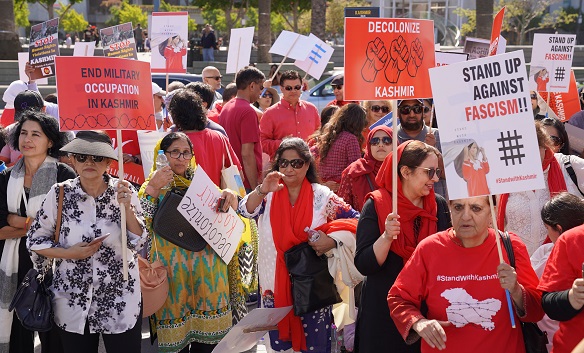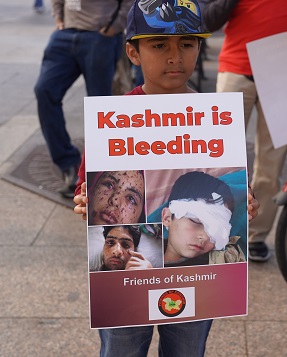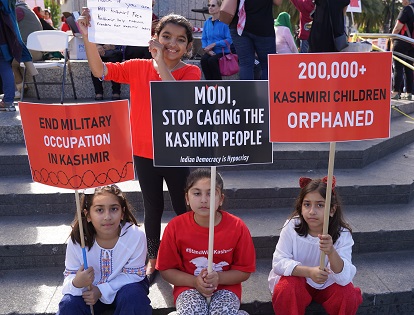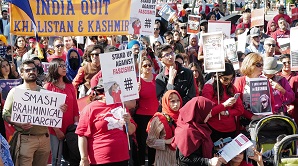January: The Month of Massacres in Kashmir
By Elaine Pasquini
Photos: Phil Pasquini

Washington: Stand With Kashmir recently assembled a compendium of atrocities committed against Kashmiris by the occupying Indian forces which have occurred in the month of January from 1990 through 1998.

Known as “The Month of Massacres in Kashmir,” the following is a list of attacks by Indian forces on the people of Kashmir occurring in January for eight years beginning in 1990.
January 19, 1990: Jagmohan Malhotra of the Bharatiya Janata Party was appointed the governor of Jammu and Kashmir. On this date local police on the streets of Srinagar, the largest city and summer capital of Muslim Kashmir, were replaced by India’s brutal Central Reserve Police Force (CRPF).
January 20, 1990: The CRPF conducted groundless arrests and assaulted women in several houses in the old city locality of Chota Bazar.
January 21, 1990: As news about the previous day’s attacks spread, a protest rally organized against the military crackdown and atrocities marched into Gaw Kadal in the heart of Srinagar. When the procession reached the Gaw Kadal bridge, the CRPF fired indiscriminately at the crowd killing over 50 civilians and injuring hundreds. The Gaw Kadal massacre marked the beginning of a series of massacres in Kashmir. Human rights defenders have called this the worst massacre in Kashmiri history.

January 22, 1990: Protests again broke out in the Alamgari Bazar neighborhood in which 10 people were killed by the CRPF.
January 25, 1990: Indian forces killed 21 protesters in Handwara on the day before India celebrated its Republic Day. The Kashmiris who gathered to protest against the military crackdown were peaceful and have never received justice.
January 19, 1991: One year later the marketplace of Magarmal Bagh in Srinagar witnessed a brutal military assault by Indian forces. Sixteen people were killed, including Muhammad Ameen Qazi and Bilal Ahmad Qazi while working inside their bicycle shop.

January 6, 1993: The Indian army killed 57 people in the Sopore market. Some of them were burnt alive after Indian forces set fire to shops and other establishments, destroying 400 businesses and 75 homes.
January 27, 1994: Indian forces shot and killed at least 27 residents of Kupwara.
January 25, 1998: Twenty-eight Kashmiri Hindus, including four children and nine women, were killed at Wandhama allegedly by Lashkar-i-Taiba.
Founded in February 2019, Stand With Kashmir (SWK) is a Kashmiri diaspora-driven independent, transnational, grassroots movement committed to standing in solidarity with the 13 million people of Indian-occupied Jammu, Kashmir, and Ladakh in ending the illegal Indian occupation of their homeland. The group supports the right to self-determination of the pre-partition state of Jammu and Kashmir.
A few days before August 5, 2019, when Indian Prime Minister Narendra Modi removed Article 370 from India’s constitution thus revoking the special status of semi-sovereignty of Jammu and Kashmir and effectively stripping Kashmiris of control over their land and resources, SWK began the #redforkashmir and #standwithkashmir campaigns. Thereafter, a worldwide grassroots solidarity movement for Kashmir arose, particularly in light of the restrictions on communication that India imposed on Kashmir. Multiple protests and educational events around the world were organized, in addition to political advocacy forums with elected officials.

Since then, SWK has moved into other arenas through a series of targeted campaigns, all directed towards raising awareness of India’s illegal occupation of Kashmir, India’s ongoing policy of incremental genocide and its burgeoning illegal settler-colonial project. Although SWK is steered by the Kashmiri diaspora, the group’s volunteers and supporters are of diverse national, religious, and ethnic backgrounds.
SWK’s mission is to advocate for an end to the Indian occupation and for the right to self-determination for the people of Jammu and Kashmir. The group supports the Kashmiri people and their resistance leadership in their non-violent struggle for justice, freedom, and liberation. “While we do not advocate one particular solution for the future of the region, we strongly support a just and sustained process in which the people can ultimately decide their future through an internationally mediated referendum,” the group said in a statement.
(Elaine Pasquini is a freelance journalist. Her reports appear in the Washington Report on Middle East Affairs and Nuze.Ink.)

